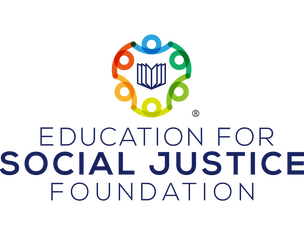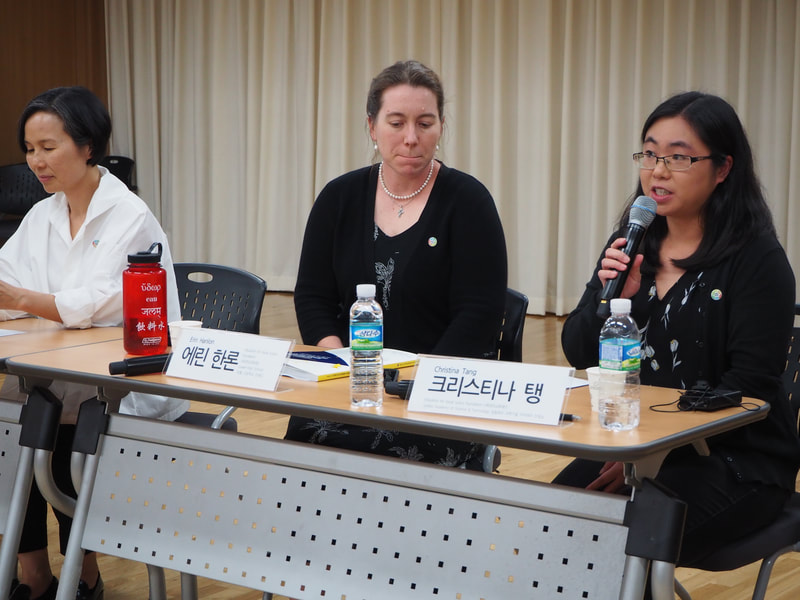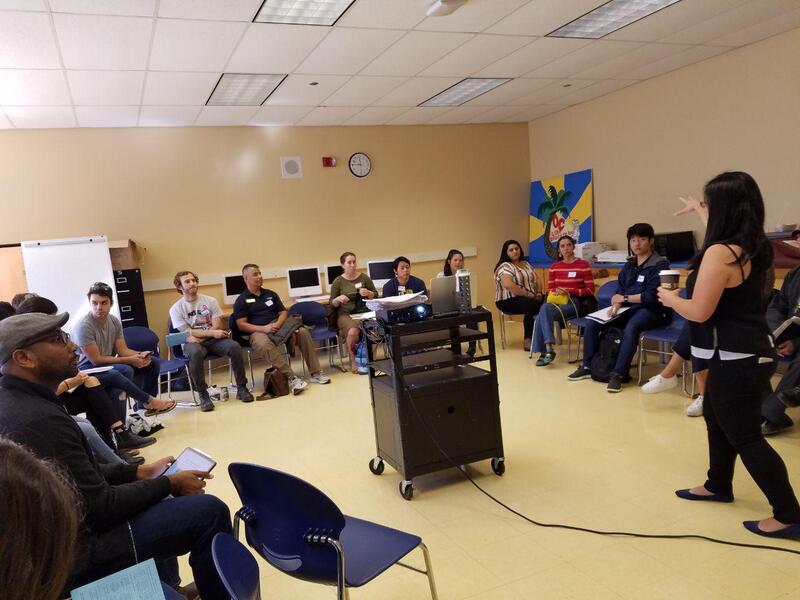|
We're delighted to share the great news that Christina Tang, ESJF’s teacher committee chair, is one of this year’s Thank-a-Teacher 4 Social Justice awardees. It was my honor to nominate her. Please keep a lookout for T4SJ’s celebration and recognition of Christina’s hard work on T4SJ’s social media platforms, website, and email blast! In her teaching, Christina draws connections between today’s issues and sidelined history, helping her students connect to the topics on a deeper level. Her lesson plans, illustrating her commitment to advancing social justice education while increasing student’s historical thinking skills, are included in ESJF’s publications.
About Christina: Since she began teaching in 2010, Christina Tang has drawn connections between today’s issues and sidelined history, helping her students connect to history and current issues on a deeper level. One sidelined historical narrative she teaches is Japanese military sexual slavery before and during WWII. She first learned about it when she was a high school student. Christina Tang kept the high school promise she made to herself: to teach her students sidelined history such as “comfort women” if she became a high school history teacher. She wrote lesson plans on the Japanese military sexual slavery system and on medical atrocities committed against African American males in Tuskegee for ESJF’s publications--“Comfort Women” History and Issues: Teacher Resource Guide, “Comfort Women” History and Issues: Student Resource Guide, and Medical Atrocities and Ethics. Her lesson plans clearly illustrate her commitment to advancing social justice education while increasing student’s historical thinking skills. As the teacher committee Chair at ESJF, she has facilitated workshops at T4SJ and Facing History and Ourselves since 2017 and 2018 respectively. She was one of the first two teachers in the United States to be invited to attend the first international teacher workshop, hosted by the Korean Council for Justice and Remembrance for the Issues of Military Sexual Slavery by Japan, on teaching the history and issues surrounding the Japanese military sexual slavery system during the International Day for the Elimination of Sexual Violence in Conflict week in June 2019 in Seoul, Korea. Christina is excited to continue her commitment to advancing educational and social justice through ESJF’s other main focus area, the history and issues surrounding Asian diaspora in the United States.
0 Comments
Solidarity message sent to the Korean Council for 1457th Wednesday Demonstration, September 189/18/2020 Greetings from Education for Social Justice Foundation, a nonprofit educational organization based in San Francisco, California
ESJF’s mission is to provide education on past injustices relegated to the sidelines of history, and the history and issues surrounding Japanese military sexual slavery is one of our main interest areas. Founded in 1990, the Korean Council for Justice and Remembrance for the Issues of Military Sexual Slavery by Japan (Korean Council) began the “comfort women” movement with the victims and citizens, amplifying the movement to the international stage. The Korean Council’s history and impact are fine examples that I always mention when I discuss empowering civic engagement focused on human rights, peace, and justice. Although it was Tarana Burke who coined the word “#MeToo” in 2006, it would be only proper to recognize Hak-Soon Kim, who in 1991 publicly testified that she was a former Japanese military sex slave, as the pioneer of the “#MeToo” movement. When Hak-Soon Kim paved the way for the “#MeToo” or armed conflict “#MeToo” movement, the Korean Council, composed of 37 civic organizations, stood by her side in solidarity. The Korean Council‘s tireless effort to bring restorative justice to the victims internationally is visible. One recent example is the Korean Council’s submission of a report to the 15th U.N. Committee on Enforced Disappearances (CED) meeting held from November 5 to November 16 in Tokyo. The Korean Council’s report stated that there had been “a lack of adequate reparations to the victims” of Japanese military sexual slavery. A few days later, on November 19, the CED called upon Japan to report accurate data on the number of victims of military sexual slavery for an investigation to uncover the truth and to offer reparations to the victims. The solidarity of the Korean Council and its supporters—voicing restoring justice, human rights, and integrity of the victims as one for decades—is a legacy of the international civic movement. I support the Wednesday Demonstration, a historical platform of solidarity, inheriting the peaceful and yet incessant/resilient struggle for bringing human rights and justice for all. Thank you! Sung Sohn, Co-Founder & Executive Director of ESJF 안녕하세요, 사회정의교육재단에서 인사드립니다. 사회정의교육재단에서는 ‘위안부’ 피해자 역사와 같이 잘 알려지지 않은 역사를 미국에서 가르치고 있습니다. 1990년부터 일본군 ‘위안부’ 피해자들의 정의구현과 존엄회복을 위해 끊임없이 활동한 그리고 ‘위안부’ 피해자 인권운동을 국제사회 여성인권운동과 평화운동으로 자리잡게 한 정의연의 역사와 운동은 저희 재단이 미국에서 인권과 평화 그리고 시민사회 참여 의미에 대해 논할 때 빼놓을 수 없는 중요한 시민사회운동의 역사와 유산이기도 합니다. 미국에선 2006년 타라나 버크 (Tarana Burke)가 처음으로 ‘미투’라는 말을 만들었지만 전세계적으로 벌어지는 ‘미투’운동의 주춧돌은1991년 증언하신 김학순 할머니가 놓았다고 생각합니다. 또한 김학순 할머니가 이 주춧돌을 놓으실 때37개 단체로 이루어진 정대협이 할머니의 곁을 지킨 것을 잘 알고 있습니다. 1991년부터 한국에서 시작된 (전시’미투’운동이라고도 할 수 있는) ‘위안부’ 피해자 인권운동의 메시지를 유엔에도 알리는데 적극적인 역할을 한 정의연은 2018년 11월 5일부터 16일까지 열린 제 15차 유엔강제실종위원회(U.N. Committee on Enforced Disappearances) 회의에서2015년 ‘위안부’ 합의에 대한 문제점을 제시한 글을 제출했고 이에 적극적으로 응한 유엔강제실종위원회는 일본정부에 ‘위안부’ 피해자들에게 정당한 배상을 제공하는데 필요한 정보인 정확한 ‘위안부’ 피해자 숫자를 알려달라고 즉시 요청한 사실은 정의연의 세계적 중요성과 가치를 입증하는 한 예라고 할 수 있겠습니다. 한국과 다른 아시아 국가, 미국, 유럽, 그리고 유엔에서 할머니들의 정의. 인권. 존엄 회복을 위해 함께 외친 정의연과 정의연 지지자들이 함께 쌓아온 연대의 힘은 세계적 시민사회운동의 유산이기도 합니다. 세계에서 가장 오랫동안 그리고 평화적으로인권과 정의를 위한 외침을 계승하는 역사적 연대의 장인 수요시위에 함께 합니다. 감사합니다. 사회정의교육재단 대표 손성숙 |
CategoriesCategories |
Proudly powered by Weebly



 RSS Feed
RSS Feed